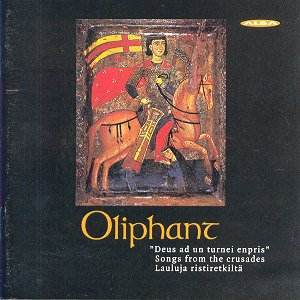SONGS FROM THE CRUSADES - "DEUS AD UN TURNEI
ENPRIS" (1189-1248)
CONON DE BETHUNE Ahi, Amours!;
Bien me Deusse targier;
HUGUES DE BERGE S'onques nus hom por
dure departie;
LE CHATELAIN d'ARRAS Aler, 'estuet
la ou je trairai paine;
THIBAUT DE CHAMPAGNE Au tans plain
de felonie; Dame, einsi est qu'il m'en convient aler; Seignor,
saiches qi or ne s'en ira;
LE CHATELELAIN DE COUCI Li nouviez
tanz et mais et violete; A vous, amant plus qu'a niulle autre
gent
HUON DE SAINT-QUENTIN Jerusalem se
plaint et li pais;
ANON Chevalier, mult estes
guariz; Vexilla Regis (plainchant); Nus ne porroit de mauvere
reson
 Oliphant: Medieval music
ensemble
Oliphant: Medieval music
ensemble
 ALBA ABCD 152 [71.46]
ALBA ABCD 152 [71.46]
Crotchet
AmazonUK AmazonUS

The crusaders' dilemma is clearly exemplified in the song Seigneur,
saichies by Thibaut de Champagne. "He who does not leave at once for
the land where Christ loved and died, and takes the cross … will hardly
go to paradise" and yet in the words of another song by Thibaut "God, why
did you create foreign countries? It has parted many lovers who have lost
comfort of love and forgotten its joy." There was, though, a joy greater
than this: "It is good to be God's servant, and not to be touched by danger
or chance; Serve well and be rewarded well." (Conon de Bethune). It is still,
even at a distance of 800 years very touching to read these words and to
hear these songs; they retain a strong quality, which, in these performances,
is captured very well.
The composers can be traced through various sources. Conon de Bethune
(c.1150-1224) is mentioned by Villehardouin in his account of the
4th Crusade c.1202. He was a politician, statesman and soldier
who left nine poems with music of which these are his two 'chansons de Croisade'.
Le Chatelain de Couci (born c.1168) who left 15 songs was on the same
crusade and died there in 1203. It is touching to read in his song 'A vous
amant' the lines "I do not know, my lady, if you will see my return. Perchance
I shall never see you again." Thibaut IV, Count of Champagne (1201-1253)
led a crusade in 1239, which ended disastrously. His father before him had
been a crusader. Hugues de Berge (c.1170-c.1228) left on the same
crusade and lived afterwards in Constantinople. Huon de Saint-Quentin
can be found on the 5th Crusade of 1219, lamenting the failure
of the knights to win Jerusalem back for God. The CD booklet points out which
songs belong to which crusade. Perhaps at the time there was a stylistic
difference between them but that is now impossible to discern.
Each song is monophonic in the manuscript, no rhythm is indicated and, of
course, no instrumental parts. In the case of a song by Thibaut, King of
Navarre its source is beautifully copied with an illustration depicting a
fiddler seated before the King and Queen, reminding us that 'trouvere' songs
were to be performed for kings and queens and princes of the earth' (Johannes
de Grocheio). String instruments were the only ones not too crude for such
an important performance. Oliphant uses shawms, bagpipes, flutes, bell drums,
symphonia, dulcimer, fiddle and various percussion. If this worries you then
I would add that they are used carefully, sometimes as introductions to,
or between, verses of the songs and also in the four instrumental-only
performances. Soprano, Uli Korhonen, who has a light and flexible voice,
which can rise to a ringing passion when appropriate, is often accompanied
by the string instruments only. Even so there is little evidence to show
that instrumental participation was used in this way (see Christopher Page
'Voices and Instruments of the Middle Ages' Dent, 1987). Sequencia in their
double CD 'Trouveres' (Deutsche Harmonia Mundi RD 77155) use only string
accompaniments throughout.
In the middle of the CD is the plainsong melody Vexilla Regis "the
mystery of the cross shines forth", reminding us that, as a result of the
7th crusade of 1248 when the French were "utterly overthrown"
according to Roger of Wendover, King Louis IX brought to Paris a piece of
the true cross. This is beautifully sung, unaccompanied. In fact my heart
sank when the first track started as the opening sound is of a bagpipe winding
up into its first drone. That is followed by some particularly powerful
horse-bells, no doubt suitable for the opening song 'Chevalier, mult estes
guariz'. The knights ride into battle "he who rides with Louis need not have
fear of hell."
These songs are, by their very nature, masculine, indeed I may say 'macho',
and to have a soprano singing them is not entirely successful. It is a pity
that Oliphant did not have a male voice for some of the songs at least, and
especially for the opening one. From that point of view David Munrow's 'Songs
of the Crusades' recorded by Argo in 1971 still remains a useful benchmark
with Nigel Rogers and Geoffrey Shaw in fine form.
Alba is a Finnish record company. They have had the song texts translated
very well but the general booklet notes are in Finnish and to me are
impenetrable. The recording is vivid and clear.
Gary Higginson

